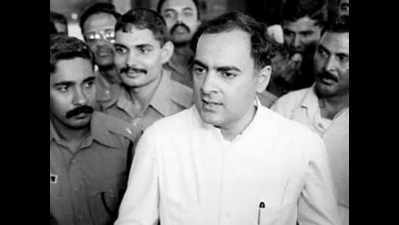- News
- City News
- chennai News
- Rajiv Gandhi assassination case: Govt informs Madras high court why governor is yet to decide on releasing life convicts
Trending
This story is from July 29, 2020
Rajiv Gandhi assassination case: Govt informs Madras high court why governor is yet to decide on releasing life convicts

Former PM Rajiv Gandhi
CHENNAI: The Tamil Nadu governor is awaiting the final report of the multi-disciplinary monitoring agency (MDMA), probing the larger conspiracy behind Rajiv Gandhi assassination, to take a decision on the recommendation made by the Tamil Nadu cabinet to release all the seven life convicts of the case, the government informed the Madras high court on Wednesday.
“The governor’s secretary has informed the state that only for this reason that the governor has not taken any decision on the recommendation so far,” state public prosecutor A Natarajan said.
The agency was constituted pursuant to the report of the Jain Commission to probe the larger conspiracy in the case involving persons of other countries like Sri Lanka. The proceeding of the agency is being monitored by the Supreme Court, the prosecutor added.
The submissions were made in view of an oral observation made by a division bench of Justice N Kirubakaran and Justice V M Velumani on July 22 that the governor cannot sit over the state’s recommendation for so long and that the court will be constrained to interfere.
When the plea came up for hearing on Wednesday, the bench questioned the delay caused by the prison authorities in disposing of the representation for parole. “Why we should not impose Rs 1 lakh as cost on the authorities for not disposing of the representation within a reasonable time,” the court said.
It might be the discretion of the authorities to grant parole or reject the request. But the decision should be made within a reasonable time, the bench added.
“Any convict who are in incarceration will be already distressed. By not disposing of their representations on time, you are pushing them to approach the court spending money,” the court said while adding that the cost of such litigations should be made to be borne by the government.
The bench then adjourned the plea to August 3 for the prosecutor to file a counter to the plea.
“The governor’s secretary has informed the state that only for this reason that the governor has not taken any decision on the recommendation so far,” state public prosecutor A Natarajan said.
The agency was constituted pursuant to the report of the Jain Commission to probe the larger conspiracy in the case involving persons of other countries like Sri Lanka. The proceeding of the agency is being monitored by the Supreme Court, the prosecutor added.
The submissions were made in view of an oral observation made by a division bench of Justice N Kirubakaran and Justice V M Velumani on July 22 that the governor cannot sit over the state’s recommendation for so long and that the court will be constrained to interfere.
Such observations were made by the court while hearing a plea moved by T Arputham – mother of life convict A G Perarivalan. She wanted the court to grant 90 days parole to her son who needs immediate medical attention in view of various ailments.
When the plea came up for hearing on Wednesday, the bench questioned the delay caused by the prison authorities in disposing of the representation for parole. “Why we should not impose Rs 1 lakh as cost on the authorities for not disposing of the representation within a reasonable time,” the court said.
It might be the discretion of the authorities to grant parole or reject the request. But the decision should be made within a reasonable time, the bench added.
“Any convict who are in incarceration will be already distressed. By not disposing of their representations on time, you are pushing them to approach the court spending money,” the court said while adding that the cost of such litigations should be made to be borne by the government.
The bench then adjourned the plea to August 3 for the prosecutor to file a counter to the plea.
End of Article
FOLLOW US ON SOCIAL MEDIA










